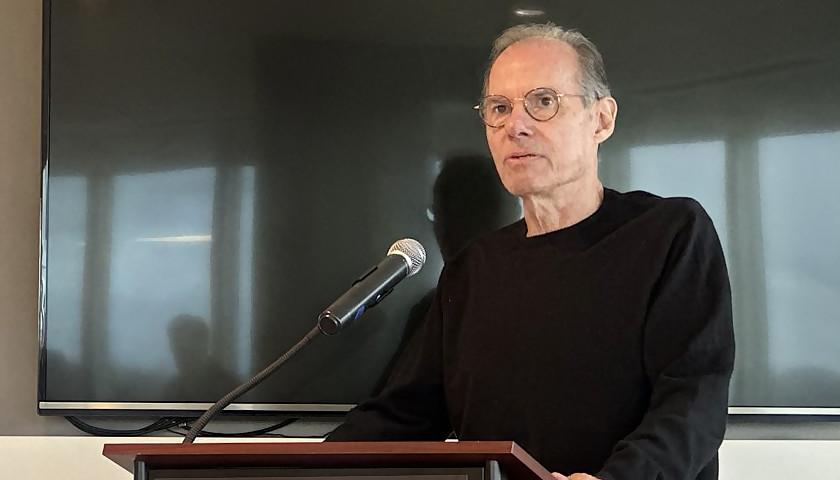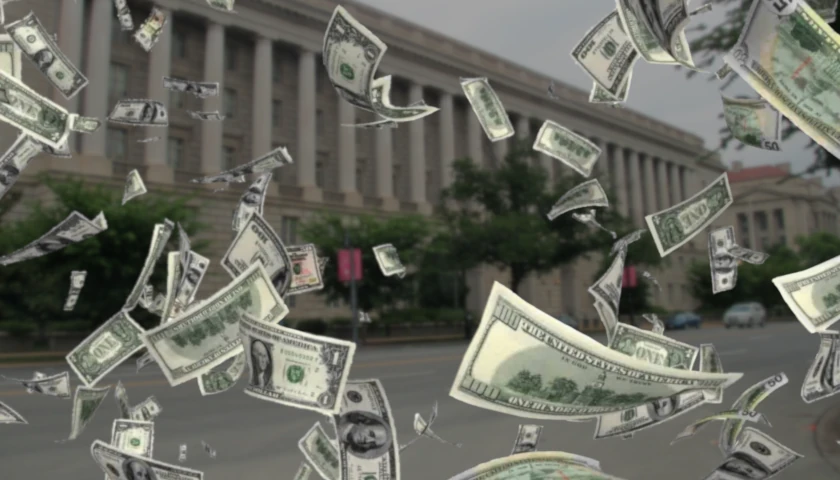by Steven Richards
President Joe Biden’s debate performance raised so many concerns about his cognitive state and advanced age that more and more Democrats are mulling replacing him as their 2024 presidential nominee. But, the president’s most likely replacement—Kamala Harris—has a political past that may give voters pause.
As the current vice president and favorite to replace Biden because of her many institutional advantages, Harris is a known entity and likely the most vetted of the potential replacement nominees. But her rapid rise through the notorious San Francisco political machine was bound to leave some marks on her record, especially on issues that are important to Democratic voters.
“Kamala Harris has a long history of using the machinery of the legal system to benefit friends and punish her adversaries,” Peter Schweizer, President of the Government Accountability Institute and author of several books focused on government corruption, told Just the News on Wednesday.
Schweizer reported extensively on Kamala Harris’ political background in California in his 2020 book Profiles in Corruption, released months before Harris was selected by then-candidate Joe Biden as his vice-presidential candidate.
Harris’ rise through the San Francisco political machine came with allegations of naked favoritism that followed her through her several state-level roles.
At the start of her political career, Harris found herself dating the powerful Speaker of the California State Assembly, Willie Brown, former mayor of San Francisco and one of the most influential San Francisco politicians in the state. At the time, Brown was a married man. Kamala Harris’ affair with the politician resulted in cushy appointments and kickstarted her political career in the District and City Attorneys’ offices, Schweizer wrote in Profiles.
After they began dating, Brown appointed Harris to the State Unemployment Insurance Appeals Board and the California Medical Assistance Commission. Each commission offered a an approximately $100,000 salary for part-time work. In a column published in 2020 in the San Francisco Chronicle, Brown acknowledged that he may have influenced Harris’ political career.
“Yes, we dated. It was more than 20 years ago. Yes, I may have influenced her career by appointing her to two state commissions when I was Assembly speaker,” Brown wrote. “And I certainly helped with her first race for district attorney in San Francisco. I have also helped the careers of House Speaker Nancy Pelosi, Gov. Gavin Newsom, Sen. Dianne Feinstein and a host of other politicians.”
But, Brown also wrote that he received a stark warning from Harris after she was elected the San Francisco District Attorney in 2003. “The difference is that Harris is the only one who, after I helped her, sent word that I would be indicted if I ‘so much as jaywalked’ while she was D.A.,” he wrote. “That’s politics for ya.”
Despite the warning, Harris would go on to show favoritism towards Brown and his political allies during her tenure in the District Attorney’s office, according to Schweizer. By this point, Brown was the Mayor of San Francisco, having run for the position in 1995.
“Over the course of her tenure, a consistent pattern emerged of favoring individuals and institutions that were either her political supporters, or those closely aligned with Willie Brown, or both. Some of these cases involved all-too-common instances of big-city cronyism and corruption involving city contracts, but other cases would involve disturbing crimes that were covered up,” Schweizer wrote.
Schweizer explained that after Harris won the office, she failed to prosecute a single case of priests’ sexual abuse as prosecutors elsewhere were uncovering allegations and bringing cases. Harris famously reversed course from her predecessor, who was attempting to release files of the alleged abusers with the victims’ names redacted. After lawyers representing the Archdiocese of San Francisco donated heavily to Harris’ District Attorney campaign, she stopped the release of the records and later blocked a journalist’s request for the records under the California Freedom of Information Act.
In another case of apparent favoritism for her former political mentor, Harris dropped remaining charges and ended a prosecution of one of his political allies, Hector Chinchilla, whom Brown had appointed to the San Francisco Planning Commission. After being appointed to this commission, he became a consultant to developers who were trying to obtain building permits from the commission. Chinchilla reportedly received over $180,000 from developers.
Chinchilla was charged with corruption by Harris’ predecessor. After a judge had dismissed some of the charges that were viewed as key to the corruption case, Harris ended the prosecution. At the time, Harris argued that no city official would be able to claim ignorance of the ethics laws, declaring a quasi-victory as the case fell apart.
The White House did not respond to a request for comment about these allegations.
Kamala Harris has also faced criticism stemming from her tenure as California Attorney General for her positions on issues that run contrary to current prevailing views in the Democratic Party.
Fellow 2020 primary candidate Tulsi Gabbard famously scorched Harris over her record as California’s top prosecutor in the July 2019 debate. “Sen. Harris says she’s proud of her record as a prosecutor and that she’ll be a prosecutor president,” Gabbard said. “But I’m deeply concerned about this record.”
“She put over 1,500 people in jail for marijuana violations and then laughed about it when she was asked if she ever smoked marijuana,” Gabbard said.
“She blocked evidence that would have freed an innocent man from death row until the courts forced her to do so. She kept people in prisons beyond their sentences to use them as cheap labor for the state of California. And she fought to keep cash bail system in place that impacts poor people in the worst kind of way.”
The evidence supports Gabbard’s claims. Even though during the primary campaign, Harris shifted her views and called for marijuana legalization, as a prosecutor, she imprisoned more than 1,500 people from 2011 to 2016 for marijuana-related offenses, the Washington Free Beacon reported. In 2010, Harris also opposed Proposition 19, a California ballot measure that would have legalized recreational marijuana in the state, while she was running for Attorney General.
Marijuana legalization has become increasingly popular among Democratic, and even conservative, voters in recent years. Harris’ shift—which flies in the face of her past views—appears to be an effort to conform more closely to the views of her party’s voters.
Harris also shifted her views on incarceration during the 2020 election, offering a contrast with her records as Attorney General. In October of that year, Harris penned an op-ed criticizing the criminal justice system for the over-incarceration of women. However, during her tenure in California, Attorney General Harris declined to endorse ballot measures for sentencing reforms that aligned with progressive policies. Polling shows that voters of her party have increasingly viewed the American justice system as unfair and support reforms.
Harris also fought against a court order to reduce California prison populations by that state’s Supreme Court. Her team argued in court that the state needed the prison labor and therefore it would be detrimental to release eligible nonviolent prisoners. The future vice president later claimed to be “shocked” that her staff had made this argument.
But, her record is only the first obstacle. Harris may also face difficulties with her persistently low approval ratings. When she dropped out of the presidential race in 2020, she barely managed to garner 3 percent of the vote, according to Politico.
RealClearPolitics shows Harris is polling at a 36.4 percent approval, even lower than President Biden, Just the News reported. Her close association with the current president, his accomplishments and his baggage, may be dragging her numbers down and would prove to be a tough hurdle if she is thrust into first position.
– – –
Steven Richards is a reporter for Just the News.








